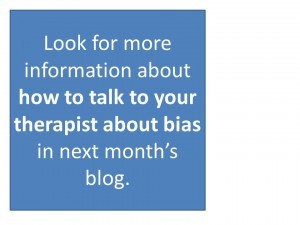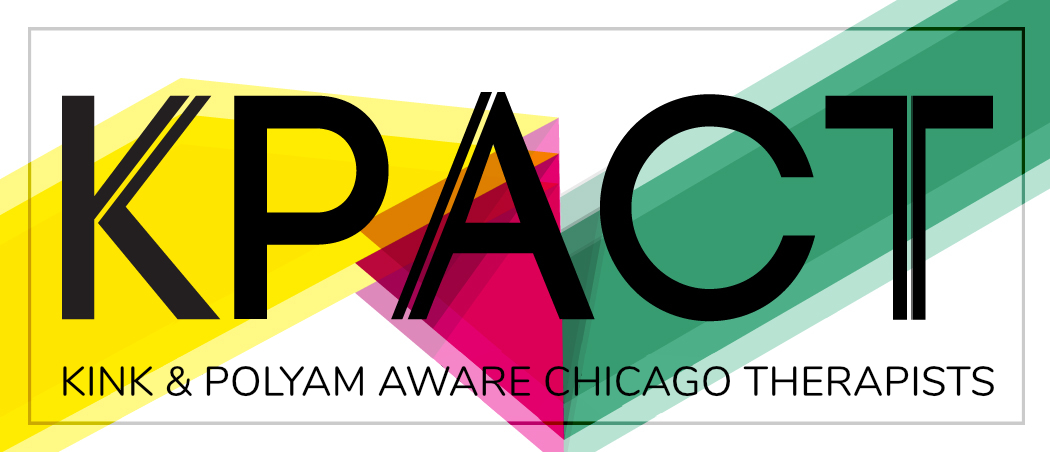No one is immune from bias, not even us therapists! Everyone has bias.
Therapist bias takes many forms, especially with regards to clients’ sexuality, gender, erotic orientation, etc…
Bias ranges from misinformed opinions about BDSM to confusing polyamory with infidelity to other subtle perceptions, beliefs and attitudes. Bias is a part of us all and we need ways to work with it, learn from it and transform ourselves.
Where Does Therapist Bias Begin?
How does bias impact clients? What can be done to mitigate its effects? Earlier this year,Rami Henrich, LCSW, and I attended the 2015 Alternative Sexualities Conference* (or ASC), where we presented “Uncovering Therapist Bias – A Lifelong Approach,” a talk about these questions and more.
*Produced by the Community-Academic Consortium for Research on Alternative Sexualities (CARAS) and Projects Advancing Sexual Diversity (PASD), the ASC brings together leading researchers, clinicians, and educators for a one-day series of seminars and discussions about cultural concerns, clinical issues, and the latest research in the field of sex-positive therapy.
We wanted to share a few of the highlights from our time at the ASC.
Why Talk About Therapist Bias?
The topic of therapist bias is especially interesting to us in our work as psychotherapists, educators and clinical supervisors. Our goal is to help the therapists we train and educate learn to recognize bias in themselves. By acknowledging that each of us holds onto certain biases, we can begin to discover and work with unknown or unexamined perceptions, beliefs and attitudes to enhance our ability to understand the diverse experiences that clients bring. We believe this is best accomplished by deepening experience and awareness toward ourselves as well as others.
Keep reading for a summary of our ASC presentation:
Therapist Bias as a Clinical Issue
At LifeWorks, our clients identify across a variety of religious and spiritual practices, genders, sexualities, erotic orientations and relationship constellations, including: lesbian, gay, bisexual, trans*, queer, non-monogamous and polyamorous, and kink and/or BDSM-identified. Many hold more than one of these identities. Being able to identify, transform and understand therapist bias when it occurs is critical to our work.
In a recent informal sampling, a significant number of clients explicitly indicated that they had had experiences where a previous therapist’s bias regarding kink or non-monogamy was an obstacle to their care or hindered their experience in therapy. In an unpublished study (Henrich, 2011), 50% of clients identifying as polyamorous reported that they had seen therapists that they felt lacked cultural competency or were biased. Participants in the study reported that therapists who were uninformed about polyamory, or biased toward monogamy lead to them avoiding certain topics or leaving therapy.
Further, a 2006 study by Drs. Keely Kolmes, Wendy Stock, and Charles Moser found 67% of therapeutic relationships with kink/BDSM-identified clients reported instances of biased care, including:
- considering BDSM to be unhealthy,
- requiring a client to give up BDSM activity in order to continue treatment,
- confusing BDSM with abuse,
- the client having to educate the therapist about BDSM,
- assuming that BDSM interests are indicative of past family/spousal abuse, and
- therapists misrepresenting their expertise by stating that they are BDSM-positive when they are not actually knowledgeable about BDSM practices.
Therapist bias can be devastating for clients. It can undermine the therapeutic relationship and prevent clients from getting the help they seek.
New Perspectives on Therapist Bias
Therapist bias, as we define it, is a perception, attitude, emotion, belief or idea that limits the therapist’s capacity to relate to their client as whole, or that creates a tendency to marginalize aspects of that person’s experience. If left unexamined, therapeutic bias can wound the client by replicating (in the therapy) the stigma and bias they face in the outside world or triggering internalized oppression and further damaging the sense of self. At the same time, we have seen bias be an important looking glass into the therapist’s and the client’s experience that can enlighten, deepen, and transform the connection and relationship between the client and the therapist.
In our work, we begin with the premise that every therapist—and in fact everyone—has bias. Bias comes from our experiences and the information we gather in life, which are filtered through our identity and culture. Some of our biases are known to us and some are unknown or hidden.
Even therapists who themselves identify as marginalized in some way—for example, those who are LGBTQ, kinky, non-monogamous, or polyamorous—may have biases about the groups with which they identify. Neither being inside or outside a given community offers immunity from bias towards that community (or any other). In our experience and anecdotal research, we find that bias is in all of us and affects us all.
LGBTQ, kinky, non-monogamous, or polyamorous—may have biases about the groups with which they identify. Neither being inside or outside a given community offers immunity from bias towards that community (or any other). In our experience and anecdotal research, we find that bias is in all of us and affects us all.
Our work on bias is shaped by the concepts and methods, developed by Arnold Mindelland others, known as process-oriented psychology or process work. Process work is an approach to working with human problems that emphasizes awareness, the flow of experience, and embracing disturbance.
Using process-oriented methods and awareness, we have been teaching psychotherapists to detect and identify bias, to unfold its meaning and to learn to relate to aspects, attitudes and behaviors of themselves or their clients that they may find difficult, disturbing or troubling. In our experience, therapist bias is often a reflection or expression of some quality or trait that the therapist has a tendency to marginalize in themselves or has a tendency to have too much of. Something important, and often subtle, may need to be known or understood better, and can be uncovered by looking closely at our reactions and perceptions.
From our perspective, getting rid of bias is probably impossible, but we have found that it is possible to embrace and transform therapist bias into something that enhances the capacity to experience and support clients’ wholeness. In our experience, however, the awareness and transformation of therapist bias is a lifelong endeavor.
During the ASC presentation, we demonstrated an inner work technique that we developed for discovering the meaning and value of bias. We guided participants through an experiential exercise, which offered participants an opportunity to learn to detect and work with their experience of bias first hand. After the exercise, participants shared their experience and learning in small groups and we then facilitated a guided debrief where participants shared what they noticed, where they got stuck in the inner work and what might be useful about what they discovered.
If you are interested in the topic of therapist bias or have had personal experiences of it, we would love to hear from you. If you have any questions about our presentation, would like to see the list of references we used, or simply want to say hello, contact us.
LifeWorks also facilitates monthly Poly & Kink Support Groups in Chicago at the Center on Halsted. For more information about these and other upcoming events, visitwww.lifeworkspsychotherapy.com/events.


